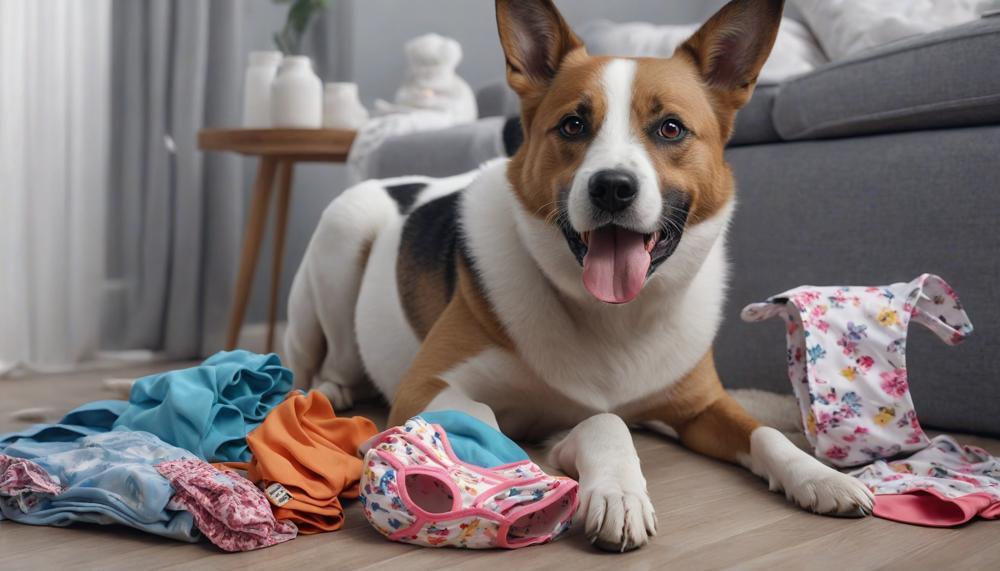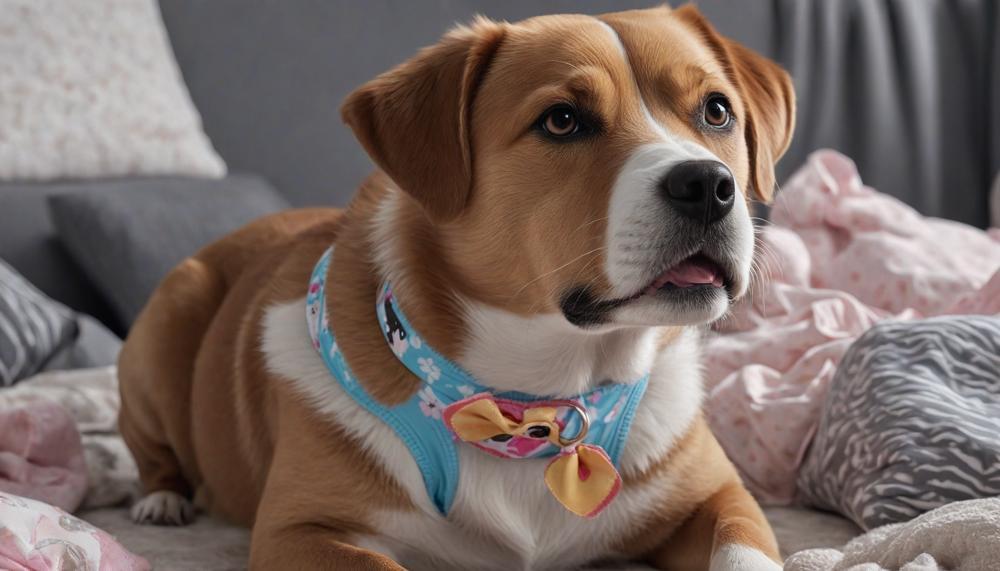Have you ever come home to find your favorite pair of underwear in tatters, courtesy of your female dog? If so, you’re not alone. This peculiar habit is more common than you might think, affecting countless dog owners across the globe.
In fact, studies suggest that a significant number of pet emergencies involve ingestion of foreign objects like underwear, with dogs being the usual culprits. This behavior not only baffles and frustrates owners but also poses serious health risks.
But why exactly do female dogs chew on underwear? This question opens up a fascinating window into the canine mind and its sensory-driven behaviors. The reasons range from the allure of your scent, which to them is as comforting as it is intriguing, to psychological factors such as anxiety and boredom. Here’s what we’ll uncover in this blog post:
- Curiosity and Sensory Attraction: Dogs, especially the younger or more energetic ones, are naturally curious animals. Your underwear carries your scent, and for your dog, that’s an irresistible call to explore.
- Behavioral Reasons: From boredom to separation anxiety, chewing provides an outlet for pent-up energy or emotional distress.
- Health Implications: While it may seem harmless, this behavior can lead to dangerous gastrointestinal obstructions, requiring urgent veterinary care.
Join us as we delve deeper into these insights, understanding not just the ‘what’ and ‘why,’ but also the ‘how’ of managing and potentially curbing this behavior in our furry friends.

Why Does My Dog Eat My Underwear?
Table of Contents
Female dogs often chew on underwear due to a variety of behavioral and instinctual reasons. Below, we delve into the primary factors contributing to this peculiar behavior:
- Attraction to Scent: Underwear carries the owner’s scent strongly, which can be particularly appealing to a dog. This scent can trigger a dog’s curiosity and instinctual desire to engage with the object.
- Curiosity and Playfulness: Dogs, by nature, are curious and playful. Chewing can be a way to explore their environment or alleviate boredom, especially when left alone for long periods.
- Anxiety or Stress Relief: For some dogs, chewing is a coping mechanism to relieve anxiety or stress. Underwear, being easily accessible and scent-rich, becomes a common target.
- Health-Related Issues: In some cases, compulsive chewing might indicate underlying health issues, such as nutritional deficiencies or gastrointestinal problems.
This behavior, while natural, poses risks such as gastrointestinal obstruction if the material is swallowed. It is crucial for pet owners to monitor their dogs and provide appropriate chew toys to redirect this behavior safely.
The Problem With Dogs Eating Underwear
Chewing and swallowing underwear can pose significant health risks to female dogs. The behaviour, while seemingly benign, stems from natural instincts and certain environmental triggers but can lead to severe medical complications. Here’s a breakdown of the potential dangers:
- Obstructions: Underwear can easily become lodged in the gastrointestinal tract, causing obstructions. This blockage can be partial or complete and is a medical emergency requiring immediate attention.
- Gastrointestinal Complications: Even if not fully obstructed, the fabric can irritate the stomach and intestines, leading to symptoms such as vomiting, diarrhea, decreased appetite, and abdominal pain.
- Surgical Intervention: In cases where the underwear does not pass through the digestive system naturally, surgical removal may be necessary. This carries risks associated with anesthesia and operation.
- Toxicity and Foreign Materials: Dyes and chemicals in the fabric may pose toxicity risks, and elastic bands or other small components can cause internal injuries.
To provide a clearer picture, here’s a table summarizing the key issues and outcomes:
| Issue | Consequence | Preventative Measures |
| Physical Blockage | Obstruction of the digestive tract, potential for severe health crisis. | Ensure all laundry is inaccessible; provide suitable chew toys. |
| Chemical Irritation | Gastrointestinal distress, possible chemical poisoning. | Use natural, chemical-free fabrics where possible. |
| Surgical Removal | Need for operation, risks associated with surgery. | Monitor your dog’s behavior closely, intervene early if unusual chewing is observed. |
Guidance: To mitigate these risks, dog owners should keep underwear and other tempting laundry items out of reach. Regular training, engaging play, and providing appropriate toys can also divert attention away from harmful chewing habits. If you suspect your dog has ingested inappropriate items, consult a veterinarian promptly to avoid escalation to more serious conditions.
How To Stop Dogs From Eating Underwear
To prevent female dogs from chewing and eating underwear, consider the following practical and effective methods:
| Veterinary Consultation | Begin by consulting a veterinarian to rule out or address any medical or nutritional issues that could be causing this behavior. |
| Secure Laundry Storage | Use closed hampers or bins for dirty laundry and ensure that clean laundry is promptly stored in drawers or closets, out of your dog’s reach. |
| Training Commands | Teach your dog commands like “drop it” and “leave it” using positive reinforcement techniques, avoiding punishment. Reward compliance with treats or affection. |
| Diversion and Engagement | Redirect your dog’s interest towards toys or games, rewarding them when they focus on these alternative activities instead of your underwear. |
| Bonding and Training | Enhance your bond with your dog through regular training sessions, which improve their obedience and attentiveness to your instructions. |
More fromThe Spruce Pets
| Behavioral Insights | Health and Wellness | Practical Dog Care |
| Explore comprehensive advice on managing common behaviors such as chewing, barking, and digging. Find tips on how to curb these actions effectively, focusing on positive reinforcement techniques. | Dive into expert-guided articles covering nutrition, exercise, grooming, and signs of illness. This section helps you ensure your dog’s physical health with up-to-date and vet-reviewed content. | Gain insight into selecting the right breed, training tips, and traveling with dogs. These articles are particularly useful for first-time owners or those looking to deepen their understanding of dog care. |
| Stopping Undesirable Chewing | Addressing Health Risks | Product Reviews and Recommendations |
| Specific strategies to redirect inappropriate chewing behaviors, such as offering suitable chew toys and establishing a consistent schedule for play and exercise. | Informative pieces on how to mitigate potential health issues related to behaviors like chewing underwear, providing preventative care tips. | Thorough reviews and unbiased recommendations on dog products like toys, food, and grooming tools, aiding you in making well-informed purchases for your pet’s needs. |
The Spruce Pets website extends far beyond simple articles; it’s a trove of insights for any dog owner.
Whether you’re facing behavioral challenges, seeking health advice, or in need of practical tips for everyday care, this platform provides an array of resources to help you nurture and enjoy life with your canine companion.
Conclusion
In unraveling the quirky behavior of female dogs munching on underwear, we discover a tapestry woven with instinct, emotion, and necessity. Central to this behavior is the potent allure of personal scents that permeate these garments, beckoning your canine with a sense of familiarity and intrigue. This aromatic appeal often triggers a dog’s inherent curiosity, urging them to chew as a form of exploration and sensory enjoyment.
Beyond mere curiosity, psychological nuances play a critical role. Many dogs chew out of boredom or anxiety, finding solace and distraction in the texture and scent of underwear. This habit not only reflects their emotional state but also their need for engagement and reassurance in the absence of their owners.
However, the implications of such behavior extend beyond torn fabrics. The ingestion of underwear can precipitate severe health emergencies, including gastrointestinal obstructions that may necessitate urgent veterinary intervention. Therefore, dog owners are encouraged to mitigate these risks through strategic household management—keeping laundry secure and providing ample toys for diversion.
Addressing this behavior effectively requires a blend of vigilance, understanding, and proactive care. By fostering a stimulating environment and maintaining close supervision, dog owners can not only protect their beloved pets but also preserve the harmony of their homes.






